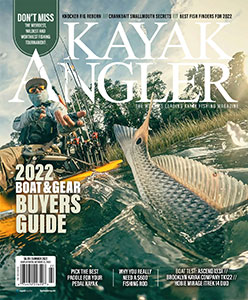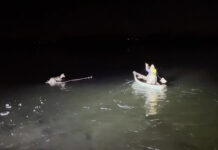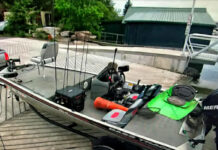The headlines in Florida warn about an Asian fish called the bullseye snakehead killing native fish. On social media, pundits worry about Indonesian clown knifefish decimating the local baitfish. Talk on the street is peacock bass from the Amazon are displacing southern Florida largemouth bass. What do you do in the whirlwind of misinformation and hysteria over nonnative fish? If you are Joe Hector, you organize the Exotic Bass Roundup and get ready to throw a party.
EKFT Exotic Bass Roundup Targets Invasive and Nonnative Fish
Joe Hector is director of Extreme Kayak Fishing Tournaments (EKFT), the long running South Florida offshore series famous for bringing big game excitement to kayak fishing. With four offshore tournaments on the schedule, Hector decided to turn his attention inland. The Exotic Bass Roundup tournament is now an annual event with thousands of dollars in prize money. “We were looking to change it up and exotic species fit under the extreme brand because of the excitement surrounding nonnative fish.”

All the fuss is about peacock bass, clown knifefish and bullseye snakehead. Peacock bass are similar in size and temperament to largemouth bass. Picture a bright green and orange bass with a black spot on its tail. Like their name says, snakehead are long, muscular fish with a wide flat head like a snake. Clown knifefish also resemble their name. Their silver body is long, thin and pointed at the tail like a knife blade.
These fish offer a unique challenge and exciting opportunity to target exotic species closer to home. Peacock bass are extremely finicky, often requiring anglers to use live bait for any hope of success. Clown knifefish are also wary of tricks, with a small mouth calling for tiny hooks and light tackle. Snakehead, like a pit viper, are aggressive and strong with a fighting attitude known to break lures and snap lines.
The backstory of Florida’s nonnative fish
According to Michelle Kerr, communications and marketing director at the Florida Fish and Wildlife Conservation Commission (FWC), butterfly peacock bass, originally from the Amazon, were stocked “as a biological control for unwanted nonnative fish species and as a supplemental sportfish.”
On the other hand, clown knifefish and bullseye snakehead were illegally released into Florida waters where they endanger native species. Kerr explains, “Bullseye snakehead and clown knifefish are considered invasive due to their potential negative impacts to native fish populations as they both consume food that native sportfish also consume.”
The wildlife commission regulates peacock as a sportfish, with size and bag limits, but most anglers release peacocks. On the other hand, the FWC considers clown knifefish and snakehead a nuisance. Kerr says, “It is illegal to introduce nonnative fish and wildlife in Florida. Anglers are encouraged to keep bullseye snakehead and clown knifefish to reduce their potential impacts on native fish populations.”
Regulations and kill orders haven’t seemed to slow the nonnative fish’s population or popularity. Florida’s warm, clear, abundant waters remind these visitors of home. And anglers come from all over to target exotics without a passport.
The transplants’ proliferation has been a boon for anglers. Scroll through social media to see photos and videos of proud anglers hoisting big peacocks, snakehead and knifefish. A cottage industry of guides and tackle suppliers depends on Florida’s exotics. Kerr says, “Documented directed effort for these species is significant, which brings meaningful economic impact.”
Competition Meets Conservation
So, back at the Exotic Bass Roundup, Hector has two objectives: highlight the nonnative fisheries and provide tournament anglers another chance to compete. Hector marvels at the exotics’ popularity. “It’s strange, but people love to catch them.” He is equally impressed by the business opportunity. “The impact on the local economy is huge,” he says.
The Exotic Roundup is held on Lake Ida, ground zero for South Florida exotic species. The primary target is peacock bass and clown knifefish. To maintain the conservation theme, only peacocks over three pounds are eligible for weigh-in and all peacock bass are weighed alive and released back to the lake.
To manage a live weigh-in, anglers hand off their eligible peacock bass to a tournament support boat. “I work with local guides to help the anglers,” Hector explains. The support boat captain puts the fish in a livewell and rushes it to tournament headquarters. Once the fish is weighed, it is released back into the lake. Hector says, “That way we put less stress on the fish.”
In addition to the peacock bass prize, there is a snakehead, oscar cichlid and sunshine bass calcutta, paying a bounty for the heaviest fish to hit the scale. “By law, we cannot release snakehead,” Hector explains. Due to the damaging effects snakehead have on the local fish populations, all snakehead are harvested. Hector adds, “The meat is delicious.”
At the end of the day, in Extreme Kayak Fishing Tournament style, they decorate a stage, turn up the music, invite the whole town and pop the champagne. “It’s still about the show,” Hector laughs.
Opinions Differ on Nonnative Fisheries
Not everyone is convinced. Hector admits invasive species draw criticism from all sides. “People inside the community get it, outsiders don’t understand,” Hector says. He’s heard complaints his tournament promotes dangerous invasive species. “These fish are big business, bringing in anglers from all over. Local tackle shops stock tackle specific to these fish,” he says.
One person who doesn’t need to be convinced is 2021 Exotic Bass Round Up champion Julie Garber. “They’re fun to catch and they really fight,” she says. Her four-pound, 13-ounce peacock crushed the competition.

Garber was fishing with a live minnow when she spotted a fish hiding under a boat dock. “I cast the minnow under a dock and the fish picked it up,” she said. The peacock bass ran and jumped until Garber had it secured in her landing net. When she saw the size of the trophy bass, she hightailed it to the help boat.
After the help boat whisked the fish away, Garber turned her attention to catching a clown knifefish to complete the pair. “People kept telling me my fish was on top of the leaderboard, but I didn’t know I won until the end of the day.”
Then, it was party time. “Joe puts on a great show,” Garber says. The live weigh-in, big checks and champagne shower bring out a crowd.
It’s not just tournament anglers who celebrate nonnative species. To keep the party going, Hector and other fans of invasive species want the popularity and the population to grow. What was once a pariah is now a regulated fishery. Hector insists, “Exotic species are too valuable to lose.”
Julie Garber (center) celebrates victory in the EKFT Exotic Roundup. | Feature photo: Courtesy EKFT



 This article was first published in the Summer 2022 issue of Kayak Angler Magazine.
This article was first published in the Summer 2022 issue of Kayak Angler Magazine. 




